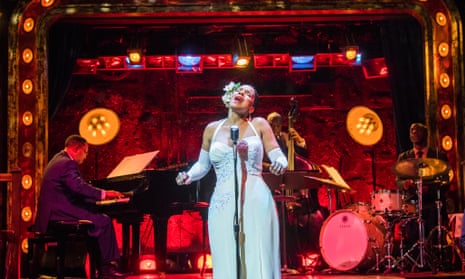One legend gets to play another in this musical play: Audra McDonald, a six-time Tony award winner, appears as the great Billie Holiday. But while it is good to see McDonald, reprising her 2014 Broadway performance, on a London stage, I find something unbearably painful about the way Lanie Robertson’s play dwells obsessively on the sad spectacle of its subject’s final humiliation.
The play’s conceit is that we are watching Holiday perform in a north Philadelphia dive in 1959, a few months before her death at the age of 44. Christopher Oram’s design not only puts some of the audience on stage but also places nightclub tables in the front stalls.
McDonald stumbles on, suggesting Holiday is high, and intersperses a dozen or more songs with rambling reminiscences. It is a joy to hear McDonald apply her operatically trained voice to Holiday’s jazz style. She gives us the rueful regret of When a Woman Loves a Man, pays raucous tribute to Bessie Smith in Gimme a Pigfoot and a Bottle of Beer and brings out the anger of Strange Fruit with its evocation of a lynching and its unforgettable line about “the sudden smell of burning flesh”. McDonald is a formidable actor as well as a fine singer: her vocal precision is matched by wayward head shifts and blurry hand gestures that suggest Holiday is not at her best.

But, when she moves into the personal memories, I was reminded of Pauline Kael’s comment on the Hollywood biopic, Lady Sings the Blues: that it ignored Holiday’s achievements to dwell on “the zingy romanticism of failure”. That is even more true here.
We hear the terrible stories of Holiday’s childhood, of the drugs bust that stripped her of her New York cabaret card and of her disastrous relationships with men, but not that she had made more than a hundred recordings by the age of 25.
There are flashes of humour in Lonny Price’s production, as when Holiday recalls her retaliation to Southern racism when touring with Artie Shaw. There is also first-rate backing from Shelton Becton as the pianist who tries to keep the singer on track, and from Frankie Tontoh on drums and Neville Malcolm on bass. But, while McDonald is a supreme artist who captures the style and spirit of Holiday, there is something morbid about the show’s fascination with the singer’s decline and fall.

Comments (…)
Sign in or create your Guardian account to join the discussion